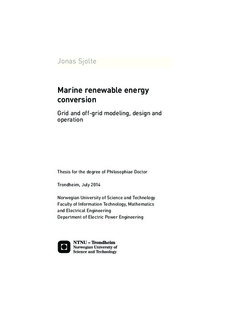Marine renewable energy conversion: Grid and off-grid modeling, design and operation
Doctoral thesis

Permanent lenke
http://hdl.handle.net/11250/257868Utgivelsesdato
2014Metadata
Vis full innførselSamlinger
- Institutt for elkraftteknikk [2468]
Sammendrag
The global energy production from renewable sources is increasing, with high penetration of both wind and solar in key regions. Ocean Wave Energy is projected to contribute with an increasing share of the future power supply, and the focus of this work is to investigate the requirements for connecting wave energy to the power grid, in context of the Fred. Olsen (FO) Wave Energy Project.
Most Wave Energy Converters (WECs) produce highly distorted power due to the reciprocal motion induced by the ocean waves. Some WEC systems have integrated energy storage that overcomes this limitation, but adds significant expenses. As an alternative approach, this work investigates direct power export that relies on aggregate smoothing among several WECs. By optimizing the position of the WEC devices with respect to the incoming waves, fluctuations may be mutually canceled out between the devices.
FO has closely monitored the global development within wave energy for about two decades, and has worked actively on developing WECs since 2002. The latest WEC system, named Lifesaver, has been in operation since April 2012 and is the basis of this thesis work. The Lifesaver system is described in detail, and comprehensive data on operational performance is presented.
The major cost driver for grid integration is the peak to average power ratio, which can be as high as 20 in the early power conversion stages. Thus, it is crucial to improve the power quality early in the conversion chain so that the downstream power system is efficiently utilized. The simulations undertaken in this work indicate that a high quality power output can be achieved at the farm level, but that significant oversize factors will be required in the intermediate power systems within the farm.
Cost-benefit analysis of the system show that a grid connected system at the current technology level will return marginal profitability. Therefore, several alternative approaches are investigated that could serve as a bridge towards future large scale systems. This includes autonomous systems that could supply power to remote ocean based units such as measurement and surveillance buoys, aquaculture facilities and support systems for the off-shore oil and gas industry.
In general, the findings show that the WEC system is well suited for grid integration, although it becomes clear that significant development remains before wave energy can become an important supplement in the energy mix. Moreover, there seems to be a market for autonomous systems that is economically viable at the current technology level that could allow for immediate deployment of commercial systems.
Består av
Sjolte, Jonas; Bjerke, Ida; Hjetland, Even; Tjensvoll, Gaute; Olsen, Fred. All-Electric Wave Energy Power Take Off Generator Optimized by High Overspeed. European Wave and Tidal Energy Conference, 2011.Sjolte, Jonas; Tjensvoll, Gaute; Molinas, Marta. All-Electric Wave Energy Converter with Stand-alone 600VDC Power System and Ultracapacitor Bank. Proceedings of the Electric Vehicles and Renewable Energy conference (EVER), 2012.
Sjolte, J.; Bjerke, I; Crozier, A; Tjensvoll, G.; Molinas, M.. All-electric wave energy Power Take Off system with improved power quality at the grid connection point. Proceedings of the Transmission and Distribution Conference and Exposition (T&D), 2012 IEEE PES: 1-7, 2012. 10.1109/TDC.2012.6281645.
Sjolte, Jonas; Tjensvoll, Gaute; Molinas Cabrera, Maria Marta. All-Electric Wave Energy Converter Connected in Array with Common DC-Link for Improved Power Quality. 3rd IEEE International Symposium on Power Electronics for Distributed Generation Systems: 431-436, 2012. 10.1109/PEDG.2012.6254038.
Sjolte, Jonas; Molinas Cabrera, Maria Marta; Tjensvoll, Gaute; Sørby, Bernt. Annual Energy and Power Quality from an All-Electric Wave Energy Converter Array. 15th International Power Electronics and Motion Control Conference and Exposition EPE-PEMC 2012, ECCE Europe, Novi Sad, Serbia: LS7a.3-1-LS7a.3-7, 2012. 10.1109/EPEPEMC.2012.6397500.
Sjolte, J.; Tjensvoll, G.; Molinas, M.. All-electric Wave Energy Converter array with energy storage and reactive power compensation for improved power quality. Proceedings of Energy Conversion Congress and Exposition (ECCE), 2012 IEEE: 954-961, 2012. 10.1109/ECCE.2012.6342716.
Sjolte, Jonas; Bjerke, Ida Kathrine; Tjensvoll, Gaute; Molinas Cabrera, Maria Marta. Summary of Performance After One Year of Operation with the Lifesaver Wave Energy Converter System. Proceedings og European Wave and Tidal Energy Conference, 2013.
Sjolte, J.; Tjensvoll, G.; Molinas, M.. Reliability analysis of IGBT Inverter for Wave Energy Converter with focus on thermal cycling. Proceedings of the Ninth International Conference on Ecological Vehicles and Renewable Energies (EVER), 2014: 1-7, 2014. 10.1109/EVER.2014.6844037.
Sjolte, Jonas; Tjensvoll, Gaute; Molinas Cabrera, Maria Marta. Power Collection from Wave Energy Farms. applied sciences. (ISSN 2076-3417). 3(2), 2013. 10.3390/app3020420.
Sjolte, Jonas; Sandvik, Christian Mclisky; Tedeschi, Elisabetta; Molinas Cabrera, Maria Marta. Exploring the Potential for Increased Production from the Wave Energy Converter Lifesaver by Reactive Control. Energies. (ISSN 1996-1073). 6(8): 3706-3733, 2013. 10.3390/en6083706.
Sjolte, Jonas; Tjensvoll, Gaute; Molinas, Marta. Self-Sustained All-Electric Wave Energy Converter System. COMPEL: The International Journal for Computation and Mathematics in Electrical and Electronic Engineering. (ISSN 0332-1649). 33(5), 2014.